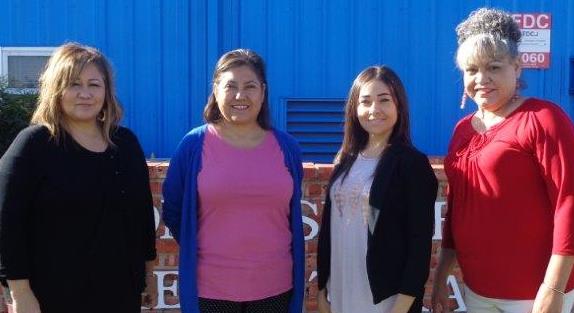“The best job around”
The lessons and benefits of working in the Smith Unit

Maria Zepeda (end right) with her colleagues (from left) Lupe Fernandez, Melony Hernandez and Priscella Salinas.
The Smith Unit, a maximum-security prison for male offenders in Lamesa, Texas, abounds with life lessons, offering unique learning experiences for those open to them. Take Maria Zepeda and her children, for example.Maria noted that, by interacting with prison inmates, she and her children have developed a deep understanding of humankind that will stay with them always. “When you work in a correctional facility, you learn how to carry yourself and to read people.” Such skills can be an asset wherever one works, she observed. “All of my children have worked here, earning money for college and so on,” Maria said.
Although her children are now “all grown with families of their own” and employed elsewhere, Maria happily continues her work at the Smith Unit. More than 16 years ago, she accepted a clerk position at the prison and has since worked her way up to where she is now—human resources supervisor.
A part of her job includes making sure that Smith Unit employees, most of whom are correctional officers, understand the benefits available to them. The cultural diversity among staff makes this a challenging task, Maria said. “There are a lot generational divisions. Some of our employees are right out of high school; some are in their 70s. They have different expectations of work.”
Working styles aside, the majority of Smith Unit employees are grateful for the benefits they receive as State of Texas employees, Maria observed. She, herself, takes full advantage of all she can. Along with her health insurance, Maria continues to use her vision and dental benefits each year. “I have saved a lot when paying for my glasses,” she said, adding that she also enrolls in TexFlex (see box) and short-term and long-term disability. “The short-term disability came in handy when I had an extended stay in the hospital.”
Working in the prison is stressful, and it can be easy to lose sight of the advantages of working for the state. When that happens, Maria likes to remind her coworkers that “when you add up the benefits, including the personal vacation and sick time we accrue … when you look at the overall picture, it’s the best job around."
Budgeting for peace of mind
TexFlex is an optional benefit, but Maria Zepeda considers it a necessity. For more than 10 years, Maria has used the program to help her plan for unexpected medical expenses.
“The fact that you’re paying a set amount on a monthly basis is great for your budget,” Maria said. It’s so much easier to save when you have it taken of your paycheck, she observed, supporting a twist on an old adage: you can’t miss what you don’t see.
And that doesn’t even get to the main benefit of TexFlex: the money you’ll save on federal income taxes when your account contributions are deducted from your paycheck pre-tax.
Her TexFlex account gives Maria a sense of security. “Insurance covers a lot, but not everything,” Maria observed, and TexFlex helps when the budget gets tight. “If you have to go to the doctor a few days before payday, you can use TexFlex to pay your copay or purchase prescriptions—it’s a helpful resource.”
One aspect of the program that Maria appreciates is the ability to use funds before the amount pledged has accumulated. Say you need to buy a new pair of prescription glasses at the beginning of the plan year. You can pay for them using your TexFlex account, so long as the cost doesn’t exceed what you’ve agreed to set aside, Maria explained.
Maria added that you should always keep your payment receipts. “Sometimes you’ll be asked to verify an expense. Keep a folder called Health Information and tuck those receipts away. That way, she said, “you’ll have it if you need one.”